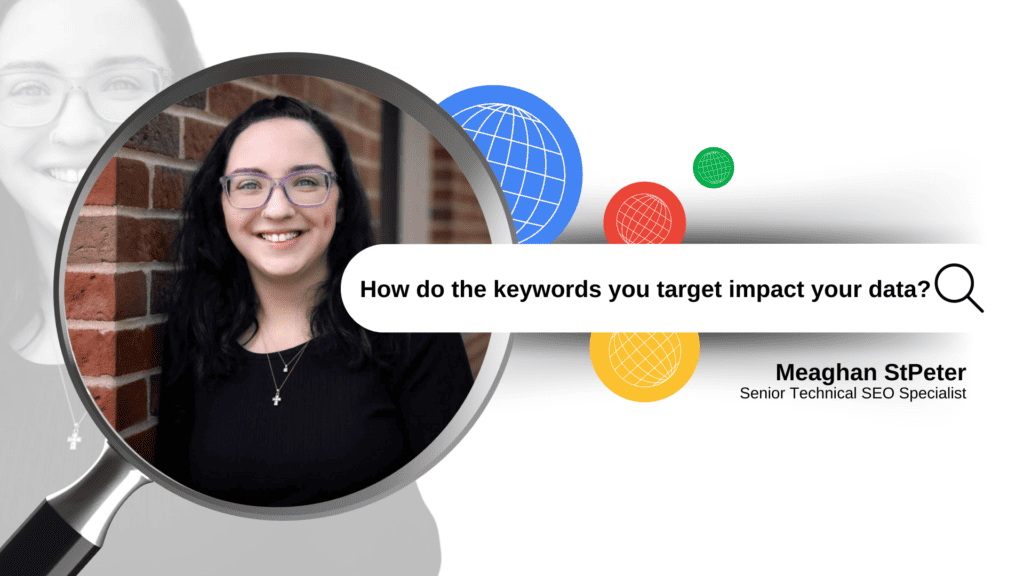
It is very possible that you are looking at an inflated version of your website’s traffic without even realizing it. And I’m not talking about Google Analytics 4 nuances or data filters. I’m talking about how the keywords you or your vendor are targeting may be giving you a false sense of growth. This is because not all traffic is equal, and beyond growing numbers, the reason people are visiting your website matters. This makes intent an important part of keyword research. And while intent is a piece of the puzzle that is oftentimes neglected, it shouldn’t be. So, let’s take a deeper look at what this means and how you can be sure that you’re getting a clean view of your website’s wins and losses.
Identifying Search Intent: Transactional vs Informational Keywords
When it comes to picking keywords to target, you’ll want to focus more on transactional keywords than informational keywords. Transactional keywords are exactly as they sound; they’re searches based on the intent to find products or services that a user wants or needs. For example, “Chevy Silverado 1500 for sale” would be a transactional keyword, as the user is looking to buy something. On the other hand, informational keywords are those a user is searching to learn more about something, such as “Chevy Silverado 1500 towing capacity.” Transactional keywords are searched with a purchase intent, while informational keywords are searched with a research intent.
Transactional keywords are where you’ll get conversions, which is why they should be your main target. You want to capture those looking to pay for your product (cars) or services (financing, maintenance, repairs) so that you have the opportunity to convert them into sales. Informational traffic is much harder to convert as the user is likely to come to your site, get the answer to their question, and close out. This is why old SEO strategies that include local blog posts focused on things like “the best parks in Cincinnati” or “breweries near Atlanta” don’t work. They might drive traffic to your site, but it’s not the traffic you want.
How Informational Traffic is Giving You False Gratification
While having some automotive-focused informational content on your site can help you build authority and support your transactional keyword efforts, too much informational traffic will give you false gratification. With a lot of informational-focused content marketing, you’ll be getting a lot of traffic from people who are simply looking for an answer to their questions rather than from people who are ready to buy a car. With informational content surrounding topics that aren’t related to your vehicles or services, the chance of converting these users goes down from slim to none.
Of course, though, these pieces of content will drive traffic to your site. This can trick you into thinking that your SEO is working when it isn’t helping you with your sales at all. Instead, all you have is an inflated view of your traffic, which isn’t measuring convertible visitors. Not all traffic is equal, and it’s important to remember that having tons of users visiting your site doesn’t always mean sales. So, when you’re creating a boatload of informational or “local” content, you’re not just wasting your time with efforts that aren’t going to lead to conversions; you’re also inflating your data and making it more challenging to decipher where you’re winning and where you’re losing.
Getting a Better Look at Your Traffic Data
Now, there is a way to get a general idea of how your website is performing aside from any informational traffic. Of course, you can monitor your conversions, but if you want to get a more granular view of your traffic, Google Search Console is your best friend. In Search Console, you can filter by “keywords containing,” allowing you to narrow in on transactional keywords. Filter by queries that contain “dealer,” “for sale,” “near me,” and “service” to get a good idea of whether or not your traffic increases are driven by those valuable transactional keywords. If not, it may be time to reanalyze and refocus your efforts on keywords that will lead your dealership to greater success, not just more traffic.
More Traffic Doesn’t Always Mean More Conversions
The takeaway from this is simple: more traffic doesn’t always mean more conversions. The type of traffic your website is getting is an essential part of identifying its value. More often than not, traffic from informational keywords inflates your data by displaying growth that isn’t actually getting you more sales. Transactional keywords should be your primary focus as those users are toward the end of the sales funnel and ready to make a purchase; they’re the ones you’ll be most likely to convert into a sale.
Tools are a great resource for getting a broad look at how your website is performing, but a human touch is often needed to refine the results and find meaning within them. Here at Wikimotive, we’re unapologetically human. So, if you aren’t sure whether the traffic you’re getting is meaningful or whether your content is focused in the right direction, contact us for a free website audit. We’ll take a look at your content and data and help you get a clear view of where you’re winning and where improvements could be made. Understanding the value of your traffic is essential, and we’re here to help you do just that.